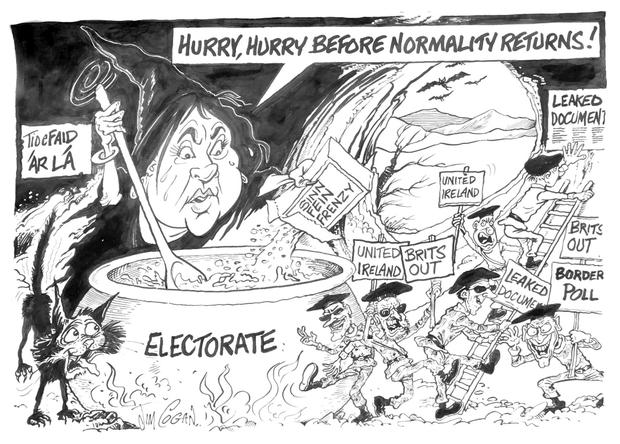
Readers of the Sunday Independent were recently treated to a charming caricature of Sinn Féin leader Mary Lou McDonald, stirring up “frenzy” in her magic cauldron, complete with black cat and crooked witch’s hat.
While there’s nothing particularly unusual about politicians being the butt of satirical doodles, portrayal of McDonald as a witch was condemned as “deeply sexist” by the National Women’s Council of Ireland, and raised concerns amongst many about gendered tropes and unfair attacks on women in politics.
Mary Lou McDonald joins a long list of female politicians, including former Tánaiste Joan Burton, US Presidential candidate Hilary Clinton and former Australian Prime Minister Julia Gillard, to be branded as a witch.
Disappointingly, I’m sure, for those accusing female politicians of witchcraft, we no longer live in the good old days where troublesome women can be burned at the stake.
However, perpetuating the stereotype of women in politics as cackling hags intent on wreaking irrational, man-hating havoc does serve the purpose of turning women off getting involved in politics altogether.
It is easy to shrug off caricatures like this as not having any real impact, especially when Mary Lou McDonald herself seems unphased, confidently tweeting “We are the granddaughters of the witches you could not burn – Deal with it #womenpower”.
What we don’t see is the number of women deflated by yet another female politician having to stand up to sexist abuse, and making the mental note to never go asking for trouble by getting involved in politics.
In a lot of ways, there is no better time in human history than right now to be a woman. Often it can be difficult to prove that sexism does still persist, as it lives in more intangible ways than oppressive laws or open discrimination. Politics, however, is one area of our society that remains blatantly and quantifiably imbalanced.
Only four countries in the world have 50% or more women in parliament (credit where it’s due to Rwanda, Cuba, Bolivia, and the United Arab Emirates). According to the UN, gender equality across the globe won’t be reached for another 130 years.
Ireland is ranked 101st globally in terms of female representation in parliament. We’ve inched up from 1% female representation in the Dáil in 1918 to an underwhelming 22.5% in 2020. Only 22 women have ever served as senior cabinet ministers, and we’re still waiting on the first female Taoiseach. If you tried to fill the Dáil with every female TD ever elected since formation of the State over 100 years ago, you’d still have 10 spare seats.
While the figures are dismal, there are some hopeful steps being taken to remove barriers for women trying to enter politics. The introduction of gender quotas in 2012, requiring at least 30% of candidates out forward by political parties to be female, led to a 90% increase in the number of women running in the 2016 elections. The quota is to be increased to 40% in 2024. Additionally, Helen McEntee will become the first Minister to take maternity leave next month, with work underway to make parental leave a permanent benefit of Ministerial positions.
But all the maternity leave and gender quotas in the world won’t be enough if women are intimidated from participating in politics in the first place.
Sure, there’s a place for caricatures and satire, but when the same tired old tropes are wheeled out again and again, you have to ask whether it’s good humoured slagging, or serving to dehumanise, discourage, and diminish the few women who do brave the world of politics.
We are very much still in the age of breaking through glass ceilings, working twice as hard for half the recognition, and striving to embody for younger generations the role model they never had for themselves. That’s a tough enough job for anyone to take on, without being dragged in the weekend papers as a wicked, wart-nosed villain.